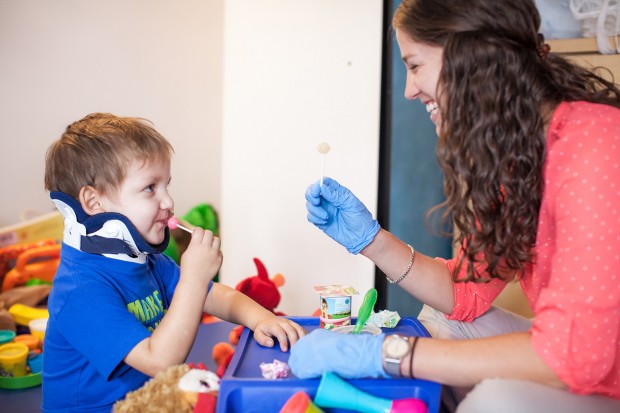Exactly How a Speech Pathologist Can Assist Improve Communication Skills
Effective communication is a cornerstone of personal and professional success, yet several people encounter challenges that impede their capability to express themselves clearly. A speech pathologist is equipped to address these barriers via targeted analysis and treatment techniques tailored to each individual's demands. By using evidence-based healing methods, they not only work to improve speech and language disorders but additionally improve general communicative proficiency. Understanding the complex duty of a speech pathologist discloses just how their proficiency can change lives, welcoming a better examination of the details techniques and results connected with their practice.
Recognizing Communication Problems
Comprehending interaction disorders is important for identifying exactly how they influence individuals' capacity to express themselves and engage with others. Interaction disorders encompass a wide variety of problems that influence speech, language, and social interaction, commonly hindering efficient interaction. These disorders can emerge from numerous elements, consisting of neurological conditions, developmental hold-ups, physical impairments, or mental issues.
Speech problems might manifest as problems in fluency, voice, or expression manufacturing, influencing how words are noticable or talked. Language problems, on the various other hand, include obstacles in understanding or using language, which can hinder both non-verbal and spoken interaction. Social interaction problems are characterized by difficulties in the practical facets of communication, such as taking turns in conversation or understanding social signs.
The consequences of communication disorders are profound, affecting not only the individual's capability to communicate feelings and ideas but also their social connections, academic chances, and general lifestyle. Understanding of these conditions can promote empathy and assistance, urging reliable approaches for interaction and interaction. Comprehending the complexities of communication disorders is a critical action in the direction of promoting inclusivity and addressing the needs of those affected.
Role of a Speech Pathologist
Speech pathologists frequently play a crucial role in detecting and treating communication disorders, employing an array of evidence-based techniques tailored per person's requirements. These professionals function with people across the lifespan, from children with speech hold-ups to grownups recuperating from strokes or terrible mind injuries. Their knowledge encompasses a selection of communication issues, consisting of expression, fluency, voice, and language problems.
In restorative setups, speech pathologists use organized interventions designed to boost communication abilities. They may implement strategies such as speech workouts, language games, and social interaction training to help with renovations in meaningful and receptive language capabilities. Speech Pathologist. In addition, they inform customers and their families concerning efficient communication methods and flexible methods to browse everyday interactions
Beyond straight therapy, speech pathologists work together with various other medical care professionals, teachers, and caretakers to make sure a comprehensive technique to therapy. They advocate for clients by supplying sources and assistance, enabling individuals to accomplish their communication goals and enhance their general top quality of life. As experts in the field, speech pathologists are necessary in cultivating effective communication, advertising freedom, and enhancing social participation for those with communication challenges.
Evaluation and Diagnosis Refine
The evaluation and medical diagnosis procedure conducted by speech pathologists usually includes a detailed examination to recognize interaction problems properly. This procedure begins with an in-depth medical history, where the clinician gathers essential details concerning the person's medical, educational, and developmental history. Recognizing the context of the person's interaction problems is vital for a precise diagnosis.
Following the medical history, speech pathologists use standardized tests and casual analyses to examine different elements of communication, consisting of speech noise production, language understanding, meaningful language, and social communication abilities. These analyses are customized to the person's age and particular issues, providing beneficial data for analysis.
Monitoring is likewise a vital component of the assessment process, as it allows the clinician to see direct exactly how the specific connects in all-natural settings. Furthermore, interviews with family members and instructors can provide understanding into the person's communication obstacles across various environments.
As soon as the analysis is total, the speech pathologist manufactures the findings to establish a diagnosis and advise suitable treatments. This extensive assessment process guarantees that people receive targeted assistance customized to their distinct interaction needs, laying the foundation for reliable therapeutic methods.
Restorative Techniques and Techniques
Many therapeutic techniques and methods are employed by speech pathologists to resolve a range of interaction disorders properly. One widely used technique is expression treatment, which concentrates on fixing speech seems via rep and visual cues. This method is especially beneficial for individuals with speech sound conditions.
One more reliable approach is language intervention, which enhances both expressive and receptive language skills. This may entail interactive tasks that advertise vocabulary development, sentence structure understanding, and conversational skills. Additionally, speech pathologists frequently utilize social skills training to improve pragmatic language capacities, additional reading enabling people to navigate social communications much more successfully.
Fluency shaping and stuttering adjustment methods are especially designed to aid those experiencing fluency problems. These strategies aid customers establish smoother speech patterns and handle the physical and emotional components of stuttering.
Furthermore, alternative and augmentative interaction (AAC) systems are used for individuals with severe interaction problems. These systems, which can consist of gestures, symbols, or digital gadgets, provide essential assistance for efficient communication.
Advantages of Speech Therapy

In addition, speech treatment can help in developing vital listening and understanding abilities, promoting better interaction in discussions. People with cognitive-communication conditions can likewise benefit, as treatment concentrates on strengthening memory and problem-solving capacities, crucial for efficient communication.
An additional essential element is the psychological support offered during therapy sessions. Speech pathologists develop a risk-free environment, motivating individuals to conquer anxiousness and stress associated to their communication concerns. This support can cause boosted self-confidence and total mental health.
Additionally, very early intervention via speech therapy can protect against additional difficulties, making sure that individuals reach their complete communicative potential. Generally, the advantages of speech therapy prolong past simple speech renovation, positively affecting various dimensions of life for those influenced by communication problems.
Verdict
In summary, speech pathologists play an important duty in dealing with interaction problems through evaluation, medical diagnosis, and tailored restorative treatments. By employing evidence-based methods, these experts improve people' speech and language capacities, fostering enhanced quality, fluency, and social communication skills. The benefits of early treatment emphasize the importance of seeking assistance from speech pathologists, as their proficiency can substantially boost communicative potential, ultimately resulting in higher success in both specialist and individual spheres.

Speech pathologists regularly play an important function in detecting and treating interaction conditions, using a range of evidence-based methods customized to each person's needs. you can try here As experts in click for more the field, speech pathologists are crucial in fostering effective communication, advertising freedom, and boosting social engagement for those with communication difficulties.
